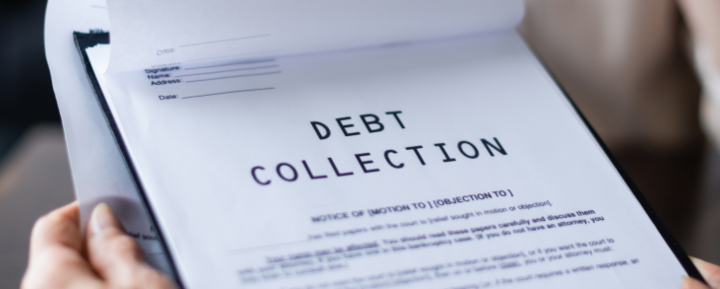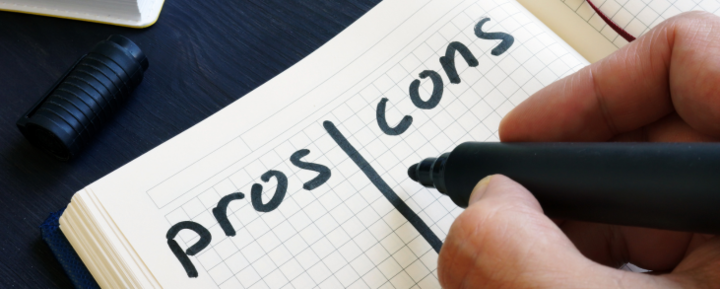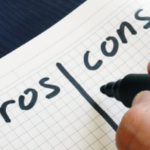Loans or credit card debt that have gone to collections can wreak havoc on your finances. It hurts your credit score, and debt collectors start calling you day and night. So you’ll want to find a solution to your debt problems ASAP.
Debt consolidation for collections accounts is one option to explore. However, there are some major pros and cons to understand first. Here’s what you should know about debt consolidation for accounts either in collections and whether it’s right for you.
What it Means When a Debt Goes to Collections
Missing one or two debt payments isn’t the end of the world and happens sometimes. You may have to pay a late fee, and your credit score likely will take a hit. But letting the account go to collections by missing many payments can have other dire consequences.
When one of your debts has gone unpaid for around three to six months, the original creditor may stop attempting to get the money from you and send it to collections instead. That could be an internal collections department that is part of the original creditor, such as a credit card company. Or they might hire an outside collection agency or even a debt collection law firm to recover the debt on behalf of the bank you owe the money to. Your debt could also be sold off to a third-party debt buyer and then go into their collection agency, which will attempt to collect as much of the debt as possible to make a profit.
Either way, it means you’ll start receiving calls, emails, and even texts from debt collectors demanding that you pay up. This collection effort will be noted on your credit reports, and as a result, your credit will be damaged considerably. And if you let the debt go unpaid too long, the creditor might file a lawsuit against you.
Once that happens, the creditor will attempt to get a judgment against you in court. If successful, they will have the legal authority to collect the debt through more aggressive means, including wage garnishment and liens against your bank accounts and property.
What Is Debt Consolidation?
Debt consolidation is one strategy people use to get their debts under control. It involves rolling multiple payments into a single monthly payment, usually at a lower interest rate. This helps make the debt more manageable since there’s only one due date to worry about. Plus, with a lower interest rate, payments are more affordable.
Debt Consolidation for Collections
Consolidating debt that’s made its way to collections can be difficult. Debt consolidation often includes getting another loan; to get a low interest rate loan, your credit has to be good. Once you are behind on payments and you have dinged your credit score, this could be challenging. Still, there are a few potential ways to go about debt consolidation for collections.
Debt consolidation loan
With this option, you take out a loan and use the proceeds to pay off your creditors. You’re then responsible for making fixed monthly payments to the new lender until that loan is paid off. Usually, people use personal loans for this purpose. Sometimes a home equity loan is used for these purposes too.
While your collections accounts will be taken care of, you’ll still need to pay off the full amount owed according to a strict schedule. So if you continue making late payments, you could end up in the same situation. Plus, as mentioned above, having accounts in collections will mean that your credit score is low.
As a result, you may not be able to qualify for a loan since you usually need good credit to be approved. Or you may have to put up collateral such as a vehicle or bank account, which is at risk of being repossessed if you miss payments.
Debt management plan (DMP)
Another option is to work with a nonprofit credit counseling agency. In this case, a credit counselor will work with you on a debt management plan. They won’t actually issue you a loan. Instead, they’ll negotiate with creditors on your behalf to come up with a modified repayment plan that better fits your budget. You’ll make a single payment to the credit counseling agency, and they’ll distribute that money to your creditors until all your debts are repaid in full over three to five years.
This is usually done for a small fee, though sometimes it’s free. (Nonprofit doesn’t mean the people working there don’t get paid or earn money. Be aware of what not-for-profit really means.)
Keep in mind that your debts still have to be paid in full. Your creditors also don’t have to agree to participate; some may not. The creditors that don’t agree to the plan may still pursue you for immediate payment while you’re on a DMP. Also, these plans are designed for unsecured debt. Most secured debt, such as a mortgage or auto loan, isn’t covered by DMPs.
Consider Debt Settlement Instead
One of the big challenges of consolidating your debt when it’s in collections is that your credit report and score are likely not in great shape. In fact, the better your score was, the bigger the hit it will take when your debt goes to collections. That means getting approved for a debt consolidation loan can be difficult. In addition, if you are approved, you’ll likely pay a high interest rate. That can make your debt expensive and challenging to pay off according to the loan’s terms. Plus, you will not have resolved the underlying cash flow issue, so you could end up back in debt again.
Another downside: You have to pay off the balance in full. If you owe a lot of money, that can strain your finances considerably. If your account is already in collections, there’s a good chance you can’t afford to pay back your entire debt anyway.
A debt settlement program is one option that lets you get out of debt without paying the full balance. It’s usually your best option when you are struggling to meet the payment schedules and want to have more control over the process. It can be a great alternative to bankruptcy. If done right by experienced debt relief attorneys, you can see the light at the end of the tunnel quickly and for a lot less emotional strain than you thought.
With debt settlement, your debt is renegotiated with your creditor to pay a portion of what you owe in a new payment plan. This could be in one lump-sum payment or a series of payments. In exchange for the payments under the negotiated debt settlement plan, the creditor will close the account for good and stop pursuing payment from you.
Why Tayne Law Makes Sense for You
Successfully settling a debt requires time and skilled negotiations. Some people handle this independently, but most find the process too difficult or stressful. Do you really know what the creditor is telling you is accurate? Perhaps you are giving away too much information to the creditor and making things worse.
That’s why hiring a reputable debt relief attorney may be the best move. They can review your financial situation and devise a plan to resolve your debt that works within your budget and gives you peace of mind. Plus, unlike many debt settlement companies, attorneys are ethically bound to act in your best interest. So you don’t have to worry about sneaky billing practices or false promises.
In many cases, debt settlement results in paying half of what you owe or even less. The deal you’re offered will depend on who you owe, how much you owe, the type of debt, and who is negotiating the debt for you. Hiring a debt relief attorney will ensure you get the best deal possible and remove the stress of constant phone calls and messages from debt collectors. You can focus on getting your budget back under control while your attorney does the heavy lifting.
Contact us today
Having a debt in collections or being unable to meet your payment schedule is a serious matter. It’s important to take steps to resolve it before you end up in court and dealing with a dire financial situation. It’s a good idea to speak with a debt relief lawyer and find out what options could work for you, whether that’s debt consolidation, settlement, bankruptcy, or some other solution. The experienced attorneys at Tayne Law Group can help. We can provide you with a free phone consultation to learn your options with our staff. So call us at (866) 890-7337 or fill out our short contact form. All communications are completely confidential.
FAQ
Debt consolidation is a financial strategy that involves combining multiple debts into a single loan or payment. The aim is to simplify the repayment process and potentially secure a lower overall interest rate. This strategy can be particularly beneficial when dealing with high-interest debts like credit cards.
Yes, debt consolidation can work for collections. By consolidating your debts, you’re essentially taking out a new loan to pay off all your existing debts, including those in collections. This may simplify your payments and could potentially lower your overall interest rate. However, be aware that this approach has pros and cons, and it may not be the best solution for everyone. Additionally, there may be better options, such as debt settlement.
Yes, debt consolidation can cause a dip in your credit score due to the hard inquiry necessary for obtaining a consolidation loan. However, it can improve your credit in the long run if you consistently make your payments on time and don’t accumulate more debt. Credit utilization and payment history are significant factors in credit scoring models.
Most types of unsecured debt, such as credit card debts, personal loans, medical bills, and collection accounts, can qualify for debt consolidation. Some forms of debt, like a car loan or mortgage, can also be consolidated, but it’s generally riskier because you’re tying these debts to your property. Additionally, student loans sometimes cannot be consolidated.
While both are strategies to manage and pay off debt, they operate differently. Debt consolidation involves taking out a new loan to pay off all your existing debts, ideally at a lower interest rate. Debt management, on the other hand, is a service provided by credit counseling agencies. They work with creditors to reduce interest rates and fees on your debts, then arrange a single monthly payment that you make to the agency, which in turn pays your creditors. Debt management plans do not involve taking out a new loan.








